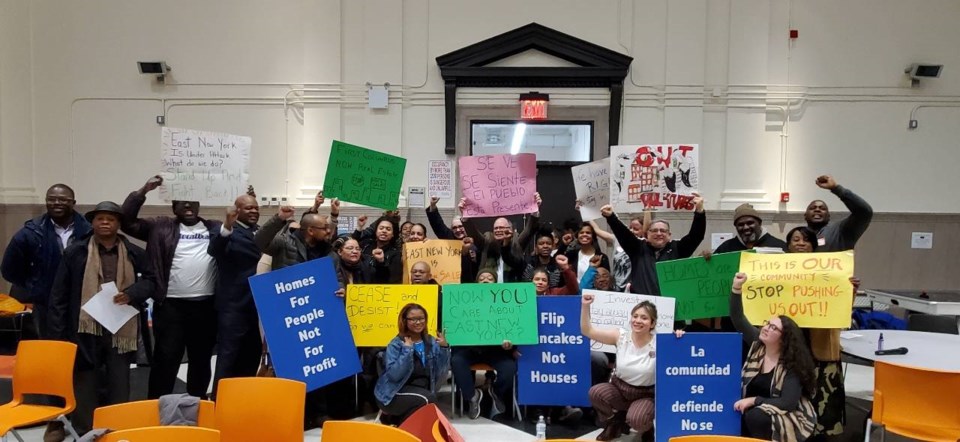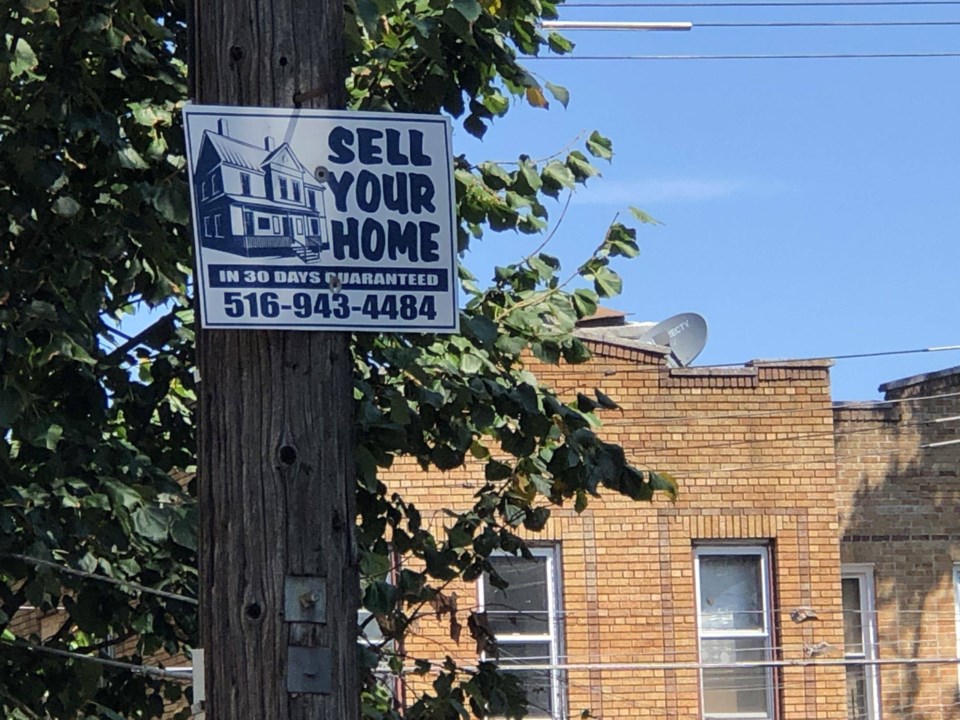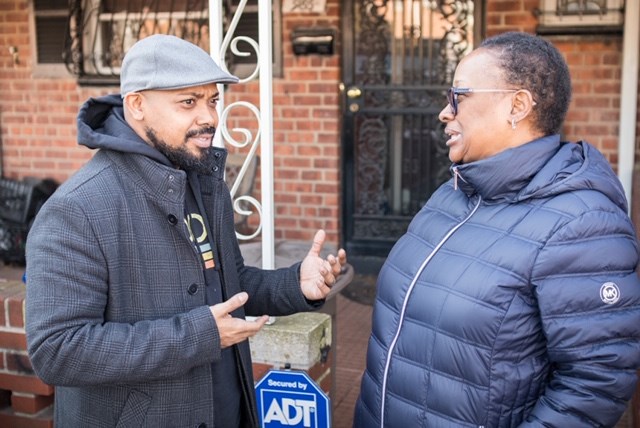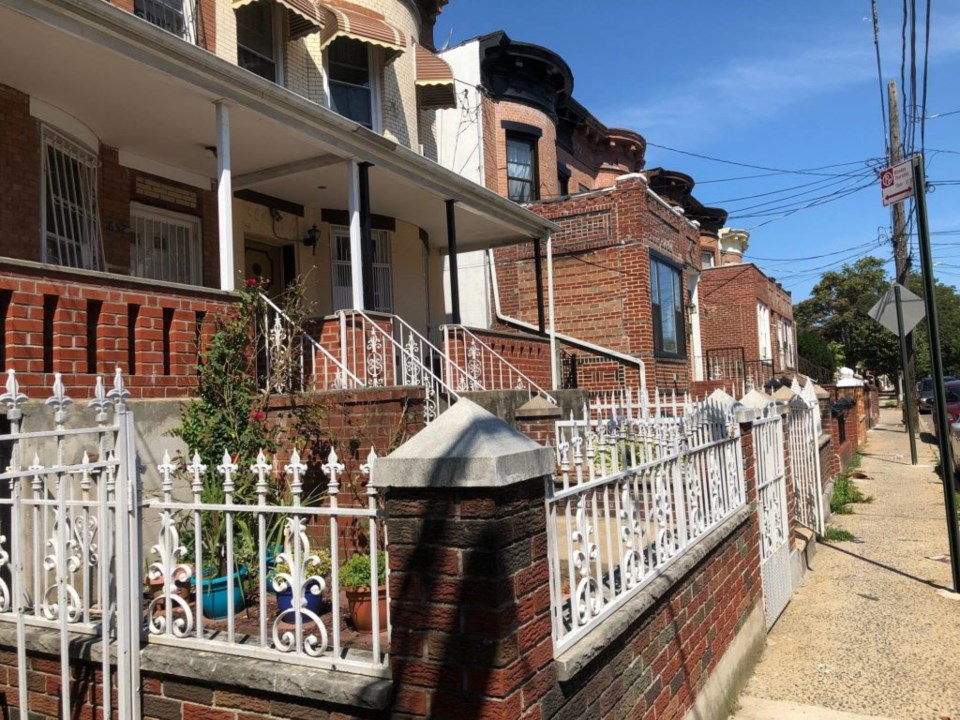Real estate investors looking to make a quick buck have gone so far as to follow one of Jessica Franco's neighbors to the grocery store and laundromat.
Franco told BK Reader speculators were harassing and lying to seniors and others in the East New York and Cyprus Hills area to get them to sell their homes below market value, so they could resell them for huge profit.
Franco is a member of the umbrella group Coalition for Community Advancement, which has been at the forefront of organizing residents to urge state officials to create a cease-and-desist zone that would protect homeowners and mitigate the destructive effects of gentrification in the community.
After a March 5 hearing, the New York Department of State set a deadline of Aug. 29 to hear final public comments on its proposed rule to create a cease-and-desist zone in a portion—but not all—of Community Board 5 (CB5).
In cease-and-desist zones, property owners can add their name to a list of people whom real estate brokers, speculators and other working in the industry are barred from contacting.

Coalition members and community residents at the March 5, 2020 hearing. Photo: Courtesy of the Coalition for Community Advancement.
Testimonies of East New Yorkers
At the March hearing, state officials listened to testimony from residents about the aggressive tactics used to get them to sell their houses.
"After holding a well-attended public hearing in Kings County, and receiving substantial evidence from many homeowners, the Secretary has found that homeowners within the zone proposed by this rulemaking are subject to the types of solicitations that Section 442-h and cease-and-desist lists are intended to guard against," the Department of State's administrative rules division said in its July 1 state Register, the state's official journal on proposed regulations and rulemaking activities.
The Register documented testimonies of residents at the hearing who complained the high-pressure tactics have gone too far and they need relief.
"Several residents testified to receiving multiple solicitations on a daily basis, having vehicles parked in front of their home and then being stopped as they went about their private routines only to be solicited," the report added.
Seeking to expand the proposed zone
Franco said the coalition was elated by the state's cease-and-desist zone proposal. However, they urged residents to ask the state to expand the zone to encompass all of CB5. Residents have until Aug. 29 to do so.
Under the current proposal, the zone would include just a swath of East New York. The community activists want it extended past Jamaica Avenue in the north and past Linden Boulevard in the south.
East New York and Cyprus Hills homeowners living outside the proposed zone would not be protected under the current perimeters.

What's at stake for renters?
Wilfredo Florentino, a longtime CB5 board member and Council District 42 candidate, told BK Reader real estate speculators were also uprooting renters. Many of the homes in East New York are small three-family houses with tenants.
"They are buying houses and flipping them to ensure that prices continue to balloon," he said. "When house prices balloon it also impacts the rental market. That's why we are seeing rents increasing in the community. It's meant to displace longtime residents who are majority Black and Brown folks."
Florentino and Franco said they predicted affordable housing would disappear in East New York after the city rezoned the area in 2016.

"Community Board 5 voted vehemently against rezoning because it did not address the issues we were experiencing as a community, and because of the issues we knew would come as a result of rezoning: displacement, disenfranchisement," he said.
The rezoning law included a mandatory inclusion housing policy, which required developers to set aside at least 20 percent of units for low-income people. Franco said that figure should be at least 50 percent.
"Mandatory inclusion is causing more displacement because new developments are causing rents in surrounding areas to increase while there are insufficient affordable units set aside," she stated.
"It causes property values to increase, so taxes increase. Developers are getting tax breaks while homeowners are not getting any tax breaks. Those homeowners are forced to pass the increase on to their tenants."
Those who want to add their voice to the cease-and-desist effort can send comments to attorney David A. Mossberg of the New York Department of State at [email protected], with a cc to the coalition, [email protected].




